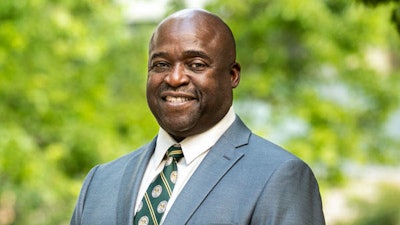George Mason University is pushing back against findings in a recent Heritage Foundation report that the school’s diversity, equity, and inclusion (DEI) staff is “bloated” and unnecessary. Dr. Gregory Washington
Dr. Gregory Washington
According to the report from the conservative think tank, Virginia’s public universities have the largest DEI bureaucracies, meaning that these schools have a higher DEI staff per faculty member ratio than schools in other states. GMU had noticeably high “DEI bloat,” with at least 69 DEI personnel and 938 tenured or tenure-track faculty – a 7.4 DEI staff per 100 faculty ratio, the report noted.
“George Mason University, which has a reputation as a right-of-center institution, has 7.4 DEI personnel per 100 tenure-track faculty, which is the highest of any public university in the country for which data were collected,” the report said. “These bloated DEI staffs are wasteful, associated with worse campus climates, and are found at universities that promote radical ideologies. Virginia policymakers must rein in this dangerous DEI expansion.”
In response, in an email to GMU staff, President Dr. Gregory Washington called the report inaccurate and out-of-touch.
“I can only conclude its authors have not spent time at Mason, because the picture they paint is wholly unrecognizable to those of us who work, study, and live here,” Washington wrote, describing the “comprehensive ideological balance” that GMU has and citing its 8th ranking for free speech rights by the Foundation for Individual Rights and Expression (FIRE).
Washington questioned and challenged the methodology the think tank used to arrive at its conclusions, claiming that the report’s count of GMU’s DEI staff, 69, lacked evidence. The school’s own count puts the number at 17, he said.
“We are being attacked for supposedly having more staff associated with DEI work than any other university they identified on a per-faculty basis. This is both odd and erroneous methodology,” Washington wrote. “Why, for example, index DEI staff to only tenured or tenure-track faculty? Why exclude non-tenured faculty, and why not against the student population for whom DEI services exist to serve? How did they even arrive at their numbers of DEI staff? They bear no resemblance to the figures we have provided those who have asked for them.”
The report criticized GMU in particular for its “disturbing amount of radical content that is inappropriate for a public university supported by taxpayers” on school websites, citing how organizations and petitions listed as ones to support included Black Lives Matter and those advocating for “defunding police departments, diminishing the traditional family, revolutionary redistribution of wealth, and radical gender ideology.”
Washington also invited the report’s authors to campus to discuss the report’s methodologies and findings.
“We do so in pursuit of the very ‘balance’ and ‘intellectual exchange’ they call for,” he wrote. “We are happy to host them on our campus. Perhaps there is something we can learn from their analysis. And perhaps there is something the Heritage Foundation can learn about George Mason University.”





















